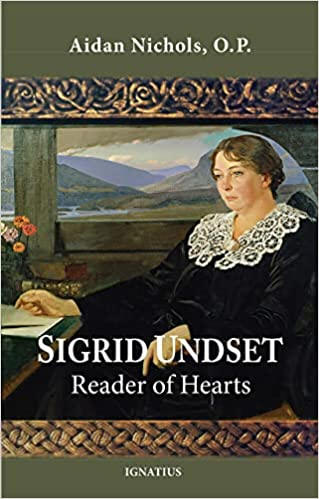Catholic Medical Quarterly Volume 73(1) February 2023
Book Review
Sigrid Undset: Reader of Hearts
by Aiden Nichols. OP. Ignatius Press. June 2022
Reviewed by Pravin Thevathasan
 Sigrid
Undset was a truly great twentieth century Catholic novelist. She won the
Nobel Prize for Literature in 1928. Although she attended a Lutheran
church as a child, her parents were atheists. A religious sceptic for many
years, she was received into the Catholic Church in 1924. Norway was
profoundly anti-Catholic and attacks upon her faith and character were
frequent. Instead of backing down, she courageously defended her faith in
public.
Sigrid
Undset was a truly great twentieth century Catholic novelist. She won the
Nobel Prize for Literature in 1928. Although she attended a Lutheran
church as a child, her parents were atheists. A religious sceptic for many
years, she was received into the Catholic Church in 1924. Norway was
profoundly anti-Catholic and attacks upon her faith and character were
frequent. Instead of backing down, she courageously defended her faith in
public.
She was also a lay Dominican and it is fitting that this excellent biography is written by the excellent Dominican Aidan Nichols.
My first encounter with Undset was reading her most famous novel Kristin Lavransdatter, set in 14th century Norway. Kristin is portrayed as a sensitive person who rejects her Catholic faith in order to live with and later marry a deeply flawed person. She subsequently suffers greatly and undergoes a conversion back to the faith of her childhood by a total embrace of the Cross. She has, it would appear, quite a lot in common with Sigrid.
When we read this book, we cannot help but conclude that Sigrid Unset is a prophet for our time. She came to the conclusion that the Catholic faith alone could combat the Nazism, Communism and Secularism of her times. She also expressed great concerns about the rise of Neo-paganism, as quoted in a letter published in this book. Imagine how she would have felt had she seen Catholic prelates clutching their hearts during a bizarre act of pagan worship, as happened in Canada recently. A sure case of sheep in shepherd’s clothing.
As a good Dominican and Thomist, she was a realist. What is real is not simply what we feel is real for us. What is real is real for everyone. The subjectivists tell us that abortion may be wrong for you but it is not wrong for me. The realist speaks of objective moral principles.
I think this is key to understanding why Sigrid Undset did not revert back to the Protestantism of her childhood. The philosophical error upon which Protestantism is based is Nominalism. According to this school, there are no such things as universals. It thus rejects realism. Ultimately, this leads to the view that everything is dependant on subjective experience. Ronald Knox jokingly referred to this as a "fif" or funny interior feeling. This is the error of Modernism, a heresy that is afflicting the Catholic Church at every level today. In contrast, as the author notes, Undset wrote that the Church's inner essence is indefectible. Doctrine cannot change.
For Undset, the Church makes the Eucharist and the Eucharist makes the Church. The Eucharistic presence is the only fully valid mediation between God and the world. She thus regarded the world religions, including the Protestant ones, as inadequate. She also argued that moral teachings outside the Church are inadequate. The moral order can only be taught in its totality in that religion in which God became man.
Late in life, Kristin Lavransdatter discovered that the heart can mislead. Kristin becomes a saint in her pursuit of Truth. This requires much patience and loving struggle. Like her character, Undset did not believe in a Christian revolution. What is required is for Christianity to penetrate and transform our contemporary pagan culture.
This is a fascinating work in which we encounter the life and thought of one of the great Catholics of the twentieth century.
